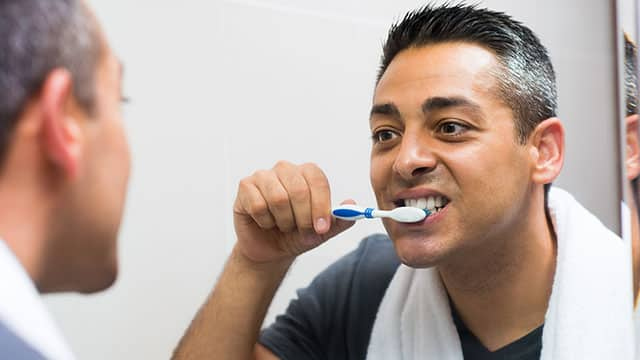But biofilms go beyond plaque in oral health. They play a significant role in periodontal health and disease, including chronic infections. Learn how biofilms develop – and what you can do to prevent and treat the development of biofilms in your mouth.
What Are the Stages of Biofilm Development?
A biofilm's formation occurs in five distinct stages. Getting into a scientific mindset, imagine your warm and moist mouth as a petri dish that nurtures the development of a biofilm at each stage.
Stage One: Free-swimming microorganisms (bacteria, fungi) in your mouth form a reversible attachment to an oral cavity surface, usually your teeth and gums.
Stage Two: The microorganisms develop a permanent chemical attachment, a single layer where they begin making the biofilm slime matrix (i.e., plaque). At this point, the microbes start consuming polysaccharides – also known as polycarbohydrates, aka sugars from the food you eat.
Stage Three: The microorganisms form a multi-layer microcolony.
Stage Four: The microcolony builds up vertically as the microbes consume more polysaccharides, and more free-swimming microorganisms join the colony. At this stage, the organism is a mature biofilm that eventually takes on a microscopic mushroom shape.
Stage Five: At this point, pieces can detach from the original colony and reestablish elsewhere, starting a new biofilm microcolony.
What Are Biofilms in Oral Health?
In the mouth, as we mentioned, you'll find biofilms in plaque. When plaque hardens, it forms calculus (dental tartar), leading to periodontal disease. Mature biofilms are very destructive to the teeth and surrounding gums.
As with bacteria, biofilms are throughout your body and can be a positive force or a negative evil. During their formation, biofilms' unique structure makes it difficult to destroy them if they're the evil type. So, biofilms are linked to producing chronic infections resistant to all kinds of antibiotics and antimicrobial agents. Usually, they're also able to resist the body's immune system.
Science researchers, though, continually study biofilms to understand the intricacies of biofilm formation. That's the first step in finding treatments biofilms can't resist.
Did You Know? Antonie van Leeuwenhoek (1632-1723), inventor of the microscope, was the first scientist to observe what would later be known as biofilm. Known as the father of microbiology, van Leeuwenhoek began studying microbes (or what he called "tiny animals"), eventually producing the first documentation of bacteria.
Four centuries after van Leeuwenhoek, scientists discovered the link between biofilms and dental plaque and tartar
How to Prevent Biofilm Buildup
You have a great chance to dislodge biofilm "slime" every day by consistently following a home oral health care routine. (Think of yourself as a biofilm-buster!) All you need to do is:
- Rinse daily with a mouthwash or mouth rinse designed to kill microorganisms before they attach themselves to your teeth and gums to form a microcolony.
- Brush twice daily with fluoride toothpaste to remove plaque.
- Floss or use an interdental product daily to remove plaque hiding between your teeth and under your gumline – before it can harden into tartar.
- Limit sugary or starchy foods, especially sticky snacks.
- Visit your dentist regularly for professional cleanings and checkups. If you have any tartar, only your dental professional can remove it.
As with most healthy habits, proper prevention will ensure a lifetime of good oral health. Routine preventive visits to your dental professionals are your best bet to remove mature biofilm before it goes out of control and threatens your oral health.
Oral Care Center articles are reviewed by an oral health medical professional. This information is for educational purposes only. This content is not intended to be a substitute for professional medical advice, diagnosis or treatment. Always seek the advice of your dentist, physician or other qualified healthcare provider.
ORAL HEALTH QUIZ
What's behind your smile?
Take our Oral Health assessment to get the most from your oral care routine
ORAL HEALTH QUIZ
What's behind your smile?
Take our Oral Health assessment to get the most from your oral care routine















